As the saying goes, where there are women, there are rivers and lakes.
In the Jianghu of child-rearing, [whether to add salt to children’s food] is one of the hot topics that have been debated all the year round.
The mother who insists on science said:
Children cannot add salt before they are 1 year old. Eating too much is not good for their health!
The mother-in-law/grandmother who insisted on experience said:
Where do you get strength without salt? No wonder children don’t like to eat without salt! This is how we used to eat!
With the elders in the dark and in the light, with the husband brainwashed popular science, even the community aunt is always [preaching]-
Tired!
In the face of people who are overwhelmed and always want to give their children salt, how can they go back with reasonable grounds?
Today, let’s have a good talk.
Children have no strength without salt? Out of date!
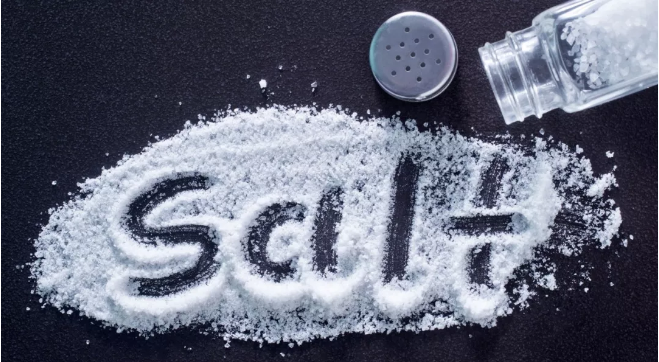
1. Not eating salt and not having strength is a [rigid symbol] left over from the old society.
In the past, living conditions were poor, and people had to tighten their belts and work in the fields.
Sweating more, losing more salt in the body and disrupting electrolyte will lead to the body’s inability to exert itself.
With limited conditions, we can only add more salt to the food to supplement our physical strength. Over time, the idea of “not eating salt and not having strength” has become deeply rooted.
In addition, salt was strictly controlled by the government in ancient times. Even at the beginning of the 20th century, there was a situation in northern Guizhou where 30 kg of rice could only be exchanged for 1 kg of salt.

It is not difficult to understand that the older generation values salt.
But now, we are no longer in an era when we need salt to supplement our physical strength.
Children are either held in their arms all day long or on the sofa floor bed. They don’t have to walk a few steps a day. They don’t sweat so much. They don’t go to the fields to work as child laborers, do they?
2. Sodium in food is enough for children’s daily needs.
The main purpose of eating salt is to supplement sodium, and the food children usually eat is enough to supplement their daily needs, so there is no need to add salt at all.
According to < < Reference Intake of Dietary Nutrients for Chinese Residents (2013 Edition) > >
The appropriate intake of sodium for babies aged 0 ~ 6 months is 170 mg per day.
The appropriate sodium intake for babies aged 6 months to 1 year old is 350 mg per day.
700 mg per day for 1 ~ 4 years old.

-
For children under 6 months old:
The sodium content in Chinese mothers’ breast milk is generally 230 mg/L, and children will not lack sodium as long as they drink 750 mL of milk every day.
For children fed with formula milk, let’s take a certain milk powder as an example. Every 100mL of formula milk contains 17.7 mg of sodium, and almost 960 mL of milk per day can be satisfied.

-
For children who have eaten supplementary foods for 6 ~ 12 months:
In addition to taking sodium from milk, it can also be obtained through daily diet.
Most natural foods contain sodium, such as eggs, pork, cabbage and even apples, which are all real [invisible salt].
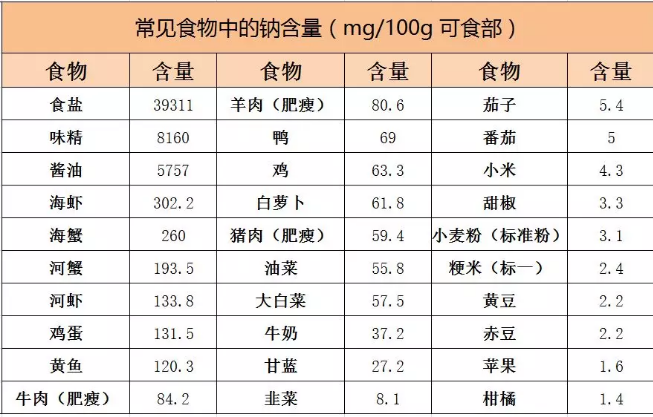
A few hundred milliliters of milk per day, plus a little eggs and meat, can reach 350 mg of sodium without any pressure.
Almost all authoritative guidelines also do not recommend adding salt to children under the age of 1.
World Health Organization:
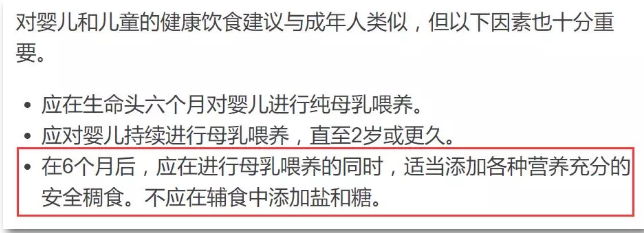
The 2016 edition of the Dietary Guidelines for Chinese Residents also recommends that children’s supplementary foods remain original and do not add salt, sugar and irritating condiments.
Children don’t like to eat without salt? Think too much!

1. Children’s taste is more sensitive than adults’
Hunan people eat Cantonese food-too light;
Guangdong people eat Hunan food-spicy.
Different people have different tastes, and the same is true for children.
For modern people who have long been accustomed to heavy oil and salt, unsalted food is comparable to [dark cuisine].
But for children, without salt, they can taste the most authentic taste of food.
About 6 months is a sensitive period for children’s taste development. His taste is more sensitive than that of adults.
Moreover, with the growth of age, people’s taste buds are constantly deteriorating. Adults think that the taste is just right, but it is already salty for children. Adults think it is light, children think it is just right.
Some people may say: How can the child resist and refuse to cooperate when he eats supplementary food?
Before the child added the supplementary food, he ate slightly sweet breast milk or formula milk, and suddenly tasted the supplementary food. This strange taste would make him unable to accept it at the moment.
But soon, he will find out-
It turns out that besides sweet, there are sour, astringent, salty, fresh and so many delicious tastes ~
Children do not like to eat supplementary foods, which may be due to insufficient variety or too soft and hard to simply think of as tasteless without salt.
Don’t many children still enjoy boiled cauliflower and carrots?
In short: Don’t measure children’s preferences by adults’ tastes.
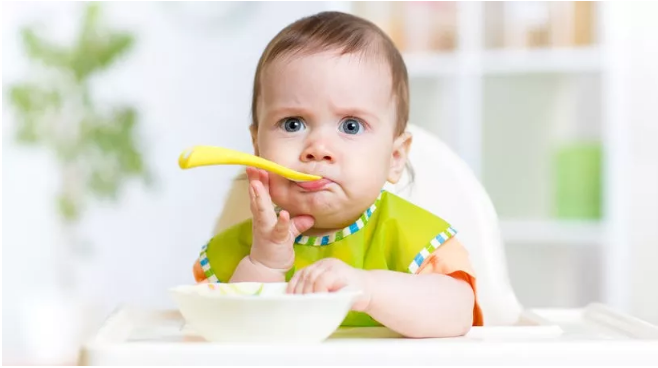
2. The food itself has its own flavor,
Even without salt, according to the child’s strong taste sensitivity, he can still sense various tastes from natural food.
- Natural sweetness: fruits, cabbage, carrots, onions, sweet potatoes, pumpkins, fruit corn, red dates, sweet peas, tomatoes, etc. Natural salty: marine fish, kelp, laver, shrimps, shellfish, cheese, seaweed, etc. Natural fresh: mushroom, pork, chicken, beef, mutton, fish, shrimp, shellfish, etc.
These are enough for children to experience all kinds of food.
Eating too much salt is harmful to children’s health.
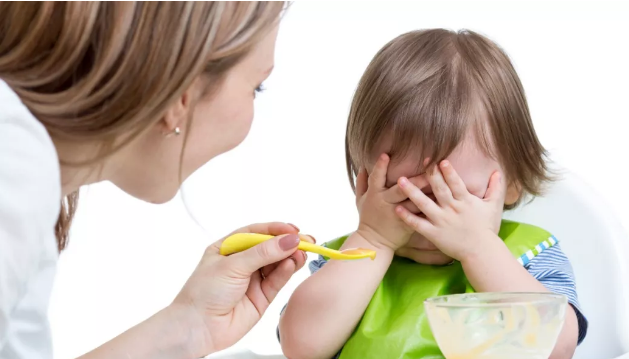
The older generation likes to add salt to their children, which is purely [good intentions do bad things]. For children, eating too much salt is not good for their health.
1. Lead children to form the habit of heavy taste, partial eating and picky eating
Children are accustomed to heavy oil and salt from an early age, so it is difficult for natural food to arouse their interest again. Over time, it is easy to be partial to food and picky about food. Who suffered in the end? Not mom yet? It is rare for children to have a bite of the hard-working food.
On the contrary, all kinds of chicken essence and monosodium glutamate are added to the restaurants outside, and the children can eat several bowls at a time.
2. Causes calcium loss in children and affects bone height development,
The main component of salt is sodium chloride. The more sodium a child consumes, the body will expel the excess sodium, but at the same time, calcium will also be lost. In the long run, children’s growth and development will also be affected.
Giving less salt to children is equivalent to supplementing more calcium, which is not unreasonable.

3. Increase the kidney burden of children and the risk of hypertension in adulthood.
The excessive salt we eat is treated by the kidney and excreted with urine. However, the kidney function of children under 1 year old is not yet mature. Once sodium is excessive, it may cause damage to the kidney of children.
Heavy salt diet will also increase children’s risk of hypertension in the future, which in turn will lead to many chronic non-communicable diseases, such as stroke and cardiovascular diseases.
According to the data of 2017 < China Cardiovascular Disease Report > >, 290 million people in our country suffer from cardiovascular diseases. Cardiovascular deaths account for more than 40% of residents’ disease deaths, which is higher than tumors and other diseases.

This has an important relationship with our long-standing high-salt diet.
You know, the daily salt intake recommended by the World Health Organization is 5g, while the average intake of Chinese residents has reached 10.5 g, more than double!
Many people always think that we are all right to eat like this all our lives.
Yes, the harm of eating too much salt to children is not immediate, but in the long run, it undoubtedly lays a big hidden danger to children’s health.
In short, children under the age of 1 generally do not need to add extra salt, and they should eat as little salt as possible after the age of 1.
This is not only for the sake of children, but also for the benefit of the whole family. Why not?
